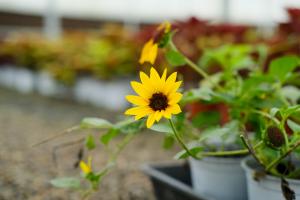How to Pollinate an Indoor Tomato Plant
If you are growing tomato plants indoors, you may find that pollination can be a challenge. Unlike outdoor tomato plants, indoor tomato plants do not have the help of bees and other insects to pollinate their flowers. In order to get a good crop of tomatoes, you will need to pollinate the flowers by hand. Here’s how you can do it:
Step 1: Understand How Tomato Plants Pollinate
Before you start pollinating your indoor tomato plants, it’s important to understand the basics of how tomato plants pollinate. Tomato plants have both male and female parts on each flower. The male part is called the stamen and it produces pollen. The female part is called the pistil, and it is where the fruit develops. In order to produce fruit, pollen from the stamen must reach the pistil. This process is called pollination.
Step 2: Identify the Flowers
The first step in pollinating your indoor tomato plants is to identify which flowers need to be pollinated. Tomato flowers first appear as small yellow buds. As they mature, they become larger and open up, revealing the stamen and pistil. Look for flowers that have not yet developed into fruit, as these are the ones that need to be pollinated.
Step 3: Pollinate the Flowers
Now that you have identified which flowers need to be pollinated, it’s time to get to work. Pollinating indoor tomato plants is easy – all you need is a small paintbrush or q-tip. Gently move the brush or q-tip around the stamen, collecting pollen on the bristles. Then, transfer the pollen to the pistil by lightly brushing it against the pistil. Repeat this process for each flower that needs to be pollinated.
Step 4: Encourage Pollination
While manual pollination is effective, you can also encourage natural pollination by gently shaking the plant. This motion can help distribute the pollen and increase the chances of pollination. You can also use a small fan to create a gentle breeze around the plant.
Step 5: Wait and Watch
After pollinating your indoor tomato plants, it’s time to wait and watch. It can take anywhere from a few days to a few weeks for the flowers to develop into fruit. Keep an eye on the plant, making sure it has enough light and water, and continue to pollinate any new flowers that emerge. In no time, you will have a thriving indoor tomato plant with plenty of delicious fruit to enjoy.
Conclusion
Growing indoor tomato plants can be a rewarding experience, but can also present some challenges. Pollination is one such challenge, but with a little bit of knowledge and effort, it can be overcome. By following these simple steps, you can ensure that your indoor tomato plant produces a bountiful crop of delicious tomatoes.

 how many times do yo...
how many times do yo... how many planted tre...
how many planted tre... how many pine trees ...
how many pine trees ... how many pecan trees...
how many pecan trees... how many plants comp...
how many plants comp... how many plants can ...
how many plants can ... how many plants and ...
how many plants and ... how many pepper plan...
how many pepper plan...































